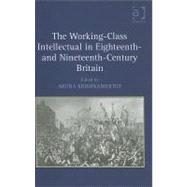The Working-Class Intellectual in Eighteenth- and Nineteenth-Century Britain
, by Krishnamurthy,Aruna- ISBN: 9780754665045 | 0754665046
- Cover: Hardcover
- Copyright: 5/28/2009
The period that stretches from the middle of the eighteenth century to the mid-nineteenth century in England has often been examined in terms of the emergence of the working classes, alongside and in response to the development of the middle-class 'public sphere'. This collection of essays contributes to that scholarship by filtering the formation of working-class identity through the rise of the 'working-class intellectual', a unique cultural figure at the crossroads of two disparate worlds. As the contributors examine how the working-class intellectual both assimilates the anti-authoritarian lexicon of the middle classes to create a new political and cultural identity, and revolutionizes it with the subversive energy of class hostility, we see that this figure generates double-edged narratives of defiance and deference that can be traced back to the 1730s, when thresher Stephen Duck made the first bold entry into the literary marketplace with his 'The Thresher's Labour'. Covering a broad range of figures, writings, and genres as they move through the key moments of working-class self-expression such as the 1790s and the period from the 1830s to the 1850, the essays consider a host of familiar figures such as Robert Burns, John Thelwall, Charles Dickens, Charles Kingsley, Ann Yearsley, and even Shakespeare, all re-evaluated in terms of their role within a working-class constituency. Further, the collection breaks fresh ground in eighteenth- and nineteenth-century scholarship by shedding light on a number of unfamiliar and underrepresented figures, such as Thomas Cooper, Alexander Somerville, Michael Faraday, and the singer Ned Corvan.






